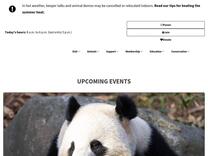Pathogens and Parasites | Smithsonian’s National Zoo and Conservation Biology Institute https://nationalzoo.si.edu/center-for-conservation-genomics/pathogens-and-parasites
Smithsonian scientists study infectious diseases and their impacts on wildlife, including malaria, invasive chytrid fungus, tick-borne pathogens and more.
Videvall Postdoctoral Researcher, Computational Genomics Scientist Anat M.

